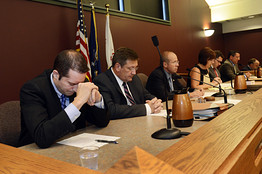Supreme Court Upholds Public Prayer at Town Board Meetings
< < Go Back
Justices Split 5-4 Along Conservative-Liberal Lines on Allowing Prayers at Greece, N.Y., Meetings.
The Supreme Court on Monday upheld the practice of public prayer before town board meetings, rejecting arguments that overwhelmingly Christian invocations violate the constitutional bar on government establishment of religion.
The case split the court 5-4 along its conservative-liberal divide, with Justice Anthony Kennedy delivering the majority opinion blessing a practice by Greece, N.Y.’s town board. “Our tradition assumes that adult citizens, firm in their own beliefs, can tolerate and perhaps appreciate a ceremonial prayer delivered by a person of a different faith,” Justice Kennedy wrote.
Greece, a suburb of Rochester, N.Y., with 96,000 residents, in 1999 began inviting clergy to offer invocations at the beginning of monthly meetings and handing out “chaplain of the month” plaques to clergy who voluntarily spoke. The practice was challenged by two local residents—one Jewish and the other an atheist—who first complained at town meetings about the prayers and then took the matter to court.
The Supreme Court’s majority held that the practice fell within acceptable American traditions that are compatible with the Constitution. “The town of Greece does not violate the First Amendment by opening its meetings with prayer that comports with our tradition and does not coerce participation by nonadherents,” Justice Kennedy wrote.
The court said the fact nearly all the clergy who delivered invocations were Christian reflected no bias. Instead, it noted the predominance of Christian prayer reflected the community, where no congregations of other faiths were listed in the town directory. And while some invocations used highly sectarian imagery, such as “the saving sacrifice of Jesus Christ on the cross,” many of the prayers were invoked more universal themes, the court said.
The decision had an immediate impact. Greece town officials said they would continue to hold prayers at the beginning of meetings. “Today we have received the affirmation from the United States Supreme Court that this practice can and will continue,” said Town Supervisor Bill Reilich.
Separately, a federal judge in Baltimore, citing the Greece decision, lifted a preliminary injunction issued in March that restricted invocations at Carroll County, Md., commission meetings. The injunction had barred invoking “the name of a specific deity associated with any one specific faith or belief in prayers given at board meetings” while a legal challenge to Carroll County public prayers went forward. The county commissioners in a written statement said they are “deeply gratified” that the injunction was lifted.
Plaintiffs challenging other public invocations in locations such as Rowan County, N.C., and Pittsylvania County, Va., were expected to face tougher odds in proving that local practices were so exclusionary that they violate the standards the court found acceptable.
“I think this is a green light to local majorities to impose their religious practices on any citizen who seeks to participate in civic affairs,” said Douglas Laycock, a University of Virginia law professor who represented the residents challenging the prayers. “It’s not an absolutely blanket approval, but it goes awfully far.”
In dissent, Justice Elena Kagan wrote, while the Constitution doesn’t impose “a bright separationist line” between church and state, Greece’s policy still violated the First Amendment’s establishment clause because it produced overwhelmingly sectarian prayers at government meetings.
“Month in and month out for over a decade, prayers steeped in only one faith, addressed toward members of the public, commenced meetings to discuss local affairs and distribute government benefits,” Justice Kagan wrote, in a dissent joined by Justices Ruth Bader Ginsburg, Stephen Breyer and Sonia Sotomayor. “The practice thus divides the citizenry, creating one class that share’s the board’s own evident religious beliefs and another (far smaller) class that does not.”
The American Civil Liberties Union, which filed a brief supporting the challengers, said it was disappointed with the ruling. “Official religious favoritism should be off-limits under the Constitution,” said Daniel Mach, director of the ACLU’s freedom of religion and belief program.
More From The Wall Street Journal (subscription required):




